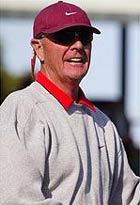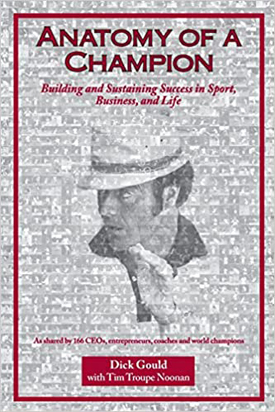Coaching is a Sacred Responsibility
Dick Gould

Thanks to the extraordinary response and generosity of 83 percent (166) of my players, I'm confident now that I am prepared to provide some answers to questions posed by two long term supporters, Jack Gifford and Matt Knoll: "How did we win so many championships, and why did we perform so well in the big moments?"
Reading all of what the players had provided in order to select responses that might suggest a better answer than the one I had originally offered--simply, we had the best players.
I was astounded to find so many different examples, detailed in this book, in which a player described what he felt was the key to our achievements. My conclusion now is that there is no one single answer, but rather many ingredients that went into our success.
The ingredients of our "secret sauce" centered largely around our recruiting and culture, and my particular style of leadership. Each of these ideas consisted of a wealth of satellite ideas, all of them important. The responses below seem to best summarize the most important answers to these two questions:
According to Mike Bryan, class of 2000, who has won more Grand Slam doubles championships than anyone in the history of the game:
"I feel the unique culture of class and greatness helped create a magical atmosphere that produced remarkable results. It came from a deep respect for the history that had been created and the high bar of excellence that was expected to be maintained.
"There was also a no-bullshit mentality. Everyone was there to work hard and be successful. Since only a handpicked select few of the best players in the country were a part of the team, it was easy to fall into this mold. When you joined the team, you automatically felt like you were there to do your job and that was to help win an NCAA championship. Coach magnified this sense of pride and purpose each and every day.

"Coach Gould had an aura that demanded respect, and he had all the attributes that made it easy for players to put their faith in him. He was always prepared and knew what to say.
"You could see that he cared deeply about his role and was extremely driven to succeed. You could see that he knew the formula of what it took to be a championship team, so there was no reason to resist it.
"There was never doubt in his eyes, and he always corifidently executed his plan. It was nice to be able to trust that this man could guide the team, and in tum help every member reach his full potential."
Nick Saviano, class of 1973, a member of one of my first championship teams and today one of America's greatest coaches, sums it up from his vantage point of almost a half-century past:
"I think in reviewing Dick Gould's legacy, as with any person who has achieved truly great results, it is most important that people don 't get blinded by the results. It is critical to understand that the results that Dick had are truly the by-product of his personal greatness.
"His pursuit of constant and relentless improvement. His pursuit of fulfilling and executing the value systems of work ethic, attention to detail, perseverance, determination, a willingness to take chances to do and be special, never letting his competitors see him down or discouraged, his amazing recruiting skills, optimism, can-do mentality, and his understanding of the poem he once showed me called, I believe, The Station, which if I may paraphrase, says that you never really arrive at the station and that life is really about the journey and the importance of making the absolute most of every day."
"If I were to summarize it all up, it would be that Dick had and has a profound understanding that life is about the journey and for God sakes make the most of it!
"This is of course I have learned it in other ways and through my own life experiences, but Dick’s example has been so relentless and consistent that it has left an indelible impression on me in my life.

"Life is a journey, a blessing, an opportunity, so don't waste today. Make the most of it! The results are truly the by products of an incredibly powerful and positive philosophy of life! That is a true legacy. "
Coaching in any arena is a Sacred Responsibility! I cannot emphasize this enough. I think most of the people with whom I have had the opportunity to teach and coach would say the same thing.
But there is something extra special about working intensively (three hours a day, six days per week throughout the school year for four years) with young people who are eighteen or so and away from home for the first time-who want to make their own choices and perhaps think they know it all, but in many ways, really have minimal life experience on which to base their decisionmaking.
(In essence, just as I was when I started coaching.) The opportunity to serve as a mentor or role model at this critical age of independence carries with it a tremendous responsibility.
I have a responsibility to be certain that, in attempting to be the best, values and high standards are never sacrificed. We had our moments, but I was so very proud overall of how our teams represented themselves, their families, their teammates, our university, and our sport-both on the court and off.
We set the bar high in showing how to win with humility and lose with grace. This to me was as important as any wins and losses, and I think my players understood this and became better people because of it.
In the end, it was not the win nor the loss, but the process of it all that made the attempts worthwhile. I truly believe that our opposing players and coaches--although they wanted to beat the heck out of us, because frankly, we were the gold standard--had the utmost respect for how we competed.

As Scott Humphries, class of 1998, describes, "The coaching staff put the responsibility back on the players to hold each other accountable, which is one of the reasons I think the teams for decades were so strong.
"Unselfishness, respect for the program, sportsmanship. With all the guys who have come through the program, my feeling was that all of them were able to put the team goals over their own. I think this was just the culture.
"The sportsmanship piece is tied into the respect for the program because Coach stressed that we were representing the university, the team, and ourselves, and the teams always did it in a classy way. "
Achieving realistic goals is important, whether the goals are related to how one represents oneself or to performance itself. I am proud of what we accomplished in both areas, while rising from almost nowhere to winning seventeen national team championships in twenty-eight years!
After thirty-eight years at the men's coaching helm, and from the perspective of another fourteen years while serving as director of tennis in an administrative role, my advice to young coaches and young leaders of any type is to never lose sight of your dreams and never stop working to achieve them.
There may be some pain and disappointment along the way, but that is life. Use those as opportunities to learn. The true measure of a person is how they rebound from these setbacks. If one approach doesn't work, try another. But above all, persevering for the right reasons and undertaking noble causes is a virtue, especially in this age of instant gratification!
Of course, it only took me thirty-eight years to learn all of this, and even now, it took the players to articulate it all. And this was only the foundation for other lessons I would also come to learn.

Since day one, I was a work in progress, and for all great coaches I suspect this learning and striving to get better never stops.
Other leaders and coaches would have a different matrix of strategies and values, but these were mine. It always started with me setting a good example, by exhibiting class and integrity, and expressing enthusiasm and positivity.
I felt I had to be organized, prepared, and listen to my players while communicating my own expectations and feelings. Then, putting the team first, we worked hard with a purpose and made no excuses. It wasn't always perfect, but it was pretty successful. In looking back over the years, there is so much for which I have to be thankful-my health, my family, my friends, and my "hobby": the teaching profession!
I take none of these for granted. I have been blessed to have had the incredible opportunity to serve well into the fifty-second year at my alma mater (the longest of any employee in the history of Stanford's department of athletics). But all good things at some time come to an end.
When I finally retire, I will be proud to have my tombstone read:
- He had a great ride
- He went for it
- He got better
- He had fun
- He did it the right way
- He had no regrets
Above all, I want to say, "Thanks to all my guys" for the time they took to express thoughts that were important to them. We had a great ride together. I am a better person for having had the opportunity to have been on this journey with them. They will always be a part of my family!





